Related Research Articles
6 was a common year starting on Friday of the Julian calendar. In the Roman Empire, it was known as the Year of the Consulship of Lepidus and Lucius Arruntius. The denomination "AD 6" for this year has been used since the early medieval period, when the Anno Domini calendar era became the prevalent method in Europe for naming years.

The gens Livia was an illustrious plebeian family at ancient Rome. The first of the Livii to obtain the consulship was Marcus Livius Denter in 302 BC, and from his time the Livii supplied the Republic with eight consuls, two censors, a dictator, and a master of the horse. Members of the gens were honoured with three triumphs. In the reign of Augustus, Livia Drusilla was Roman empress, and her son was the emperor Tiberius.

Gaius Caesar was a grandson and heir to the throne of Roman emperor Augustus, alongside his younger brother Lucius Caesar. Although he was born to Marcus Vipsanius Agrippa and Julia, Augustus' only daughter, Gaius and Lucius were raised by their grandfather as his adopted sons and joint-heirs. He experienced an accelerated political career befitting a member of the Julio-Claudian dynasty, with the Roman Senate allowing him to advance his career without first holding a quaestorship or praetorship, offices that ordinary senators were required to hold as part of the cursus honorum.
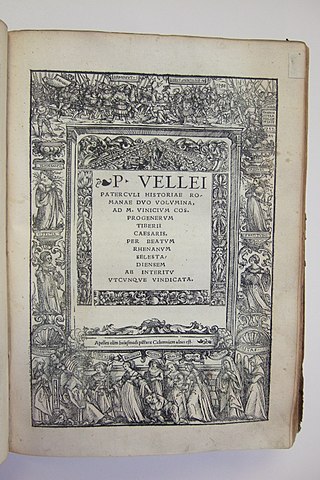
Marcus Velleius Paterculus was a Roman historian, soldier and senator. His Roman history, written in a highly rhetorical style, covered the period from the end of the Trojan War to AD 30, but is most useful for the period from the death of Caesar in 44 BC to the death of Augustus in AD 14.

The gens Aemilia, originally written Aimilia, was one of the greatest patrician families at ancient Rome. The gens was of great antiquity, and claimed descent from Numa Pompilius, the second King of Rome. Its members held the highest offices of the state, from the early decades of the Republic to imperial times. The Aemilii were almost certainly one of the gentes maiores, the most important of the patrician families. Their name was associated with three major roads, an administrative region of Italy, and the Basilica Aemilia at Rome.
The gens Scribonia was a plebeian family of ancient Rome. Members of this gens first appear in history at the time of the Second Punic War, but the first of the Scribonii to obtain the consulship was Gaius Scribonius Curio in 76 BC.

The gens Pompeia was a plebeian family at ancient Rome, first appearing in history during the second century BC, and frequently occupying the highest offices of the Roman state from then until imperial times. The first of the Pompeii to obtain the consulship was Quintus Pompeius in 141 BC, but by far the most illustrious of the gens was Gnaeus Pompeius, surnamed Magnus, a distinguished general under the dictator Sulla, who became a member of the First Triumvirate, together with Caesar and Crassus. After the death of Crassus, the rivalry between Caesar and Pompeius led to the Civil War, one of the defining events of the final years of the Roman Republic.
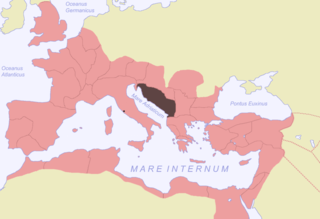
Illyricum was a Roman province that existed from 27 BC to sometime during the reign of Vespasian. The province comprised Illyria/Dalmatia in the south and Pannonia in the north. Illyria included the area along the east coast of the Adriatic Sea and its inland mountains, eventually being named Dalmatia. Pannonia included the northern plains that now are a part of Serbia, Croatia and Hungary. The area roughly corresponded to part or all of the territories of today's Albania, Kosovo, Montenegro, Serbia, Bosnia and Herzegovina, Croatia, and Slovenia.
The gens Popillia, sometimes written Popilia, was a plebeian family in Rome. The first of the Popillii to obtain the consulship was Marcus Popillius Laenas in 359 BC, only eight years after the lex Licinia Sextia opened that magistracy to the plebeians.
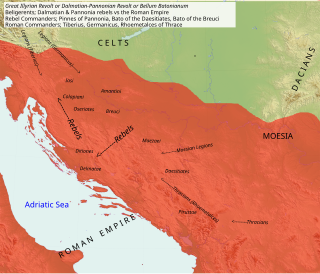
The Bellum Batonianum was a military conflict fought in the Roman province of Illyricum in the 1st century AD, in which an alliance of native peoples of the two regions of Illyricum, Dalmatia and Pannonia, revolted against the Romans. The rebellion began among native peoples who had been recruited as auxiliary troops for the Roman army. They were led by Bato the Daesitiate, a chieftain of the Daesitiatae in the central part of present-day Bosnia and Herzegovina, and were later joined by the Breuci, a tribe in Pannonia led by Bato the Breucian. Many other tribes in Illyria also joined the revolt.
Marcus Aurelius Cotta Maximus Messalinus was a Roman Senator who was a friend of the first two Roman emperors Augustus and Tiberius.
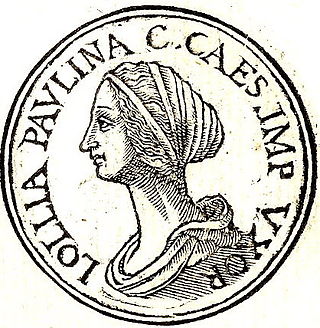
The gens Lollia was a plebeian family at Rome. Members of the gens do not appear at Rome until the last century of the Republic. The first of the family to obtain the consulship was Marcus Lollius, in 21 BC.

The gens Antistia, sometimes written Antestia on coins, was a plebeian family at ancient Rome. The first of the gens to achieve prominence was Sextus Antistius, tribune of the plebs in 422 BC.
The gens Sextia was a plebeian family at ancient Rome, from the time of the early Republic and continuing into imperial times. The most famous member of the gens was Lucius Sextius Lateranus, who as tribune of the plebs from 376 to 367 BC, prevented the election of the annual magistrates, until the passage of the lex Licinia Sextia, otherwise known as the "Licinian Rogations," in the latter year. This law, brought forward by Sextius and his colleague, Gaius Licinius Calvus, opened the consulship to the plebeians, and in the following year Sextius was elected the first plebeian consul. Despite the antiquity of the family, only one other member obtained the consulship during the time of the Republic. Their name occurs more often in the consular fasti under the Empire.

Gaius Marcius Censorinus was a Roman Senator who was elected consul in 8 BC.
The gens Fannia was a plebeian family at ancient Rome, which first appears in history during the second century BC. The first member of this gens to attain the consulship was Gaius Fannius Strabo, in 161 BC.
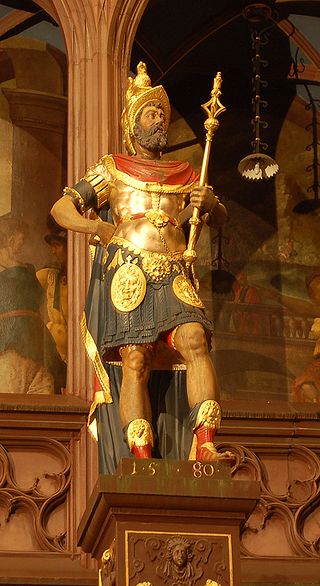
The gens Munatia was a plebeian family at Rome. Members of this gens are first mentioned during the second century BC, but they did not obtain any of the higher offices of the Roman state until imperial times.
The gens Perpernia, also found as Perpennia, was a plebeian family of Etruscan descent at ancient Rome. Members of this gens first appear in history during the second century BC, and Marcus Perperna obtained the consulship in 130 BC.
The gens Salvidiena was a plebeian family at ancient Rome. Members of this gens are first mentioned toward the end of the Republic, and from then to the end of the second century they regularly filled the highest offices of the Roman state.
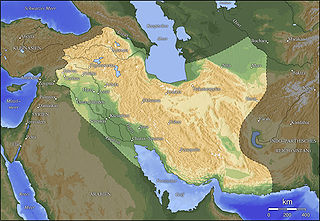
Augustus' Eastern policy represents the political-strategic framework of the eastern imperial borders of the Roman Empire at the time of Augustus' principate, following the occupation of Egypt at the end of the civil war between Octavian and Mark Antony.
References
- 1 2 3 4 5 6 7 8 9 10 11 12 13 Hazel, Who's Who in the Roman World, p.171
- 1 2 Lollia Gens article at ancient library Archived 2013-10-18 at the Wayback Machine
- 1 2 3 4 5 6 7 8 9 10 11 12 13 14 15 Marcus Lollius' article at Livius.org
- ↑ Broughton, The Magistrates of the Roman Republic, Vol II, p.365
- ↑ Appian, Civil Wars, 4:49
- 1 2 Furneaux, Cornelii Taciti Annalium, Libri V, VI, XI, XII: With Introduction and Notes Abridged from the Larger Work, p.68
- 1 2 Lansford, The Latin Inscriptions of Rome: A Walking Guide, p.p.456-457
- ↑ Lansford, The Latin Inscriptions of Rome: A Walking Guide, p.457
- ↑ Mennella, Giovanni, Marco Lollio, consul sine collega e la fondazione di Augusta Taurinorum 2012 - École Française de Rome, P. 387-394
- ↑ Tacitus, The Annals 1.10
- 1 2 Marcus Lollius no. 5 article at ancient library Archived 2012-10-22 at the Wayback Machine
- 1 2 Rickman, Roman Granaries and Store Buildings, p. 164
- 1 2 3 4 Furneaux, Cornelii Taciti Annalium, Libri V, VI, XI, XII: With Introduction and Notes Abridged from the Larger Work, p.69
- 1 2 Ronald Syme, The Augustan Aristocracy (Oxford: Clarendon Press, 1986), p. 178
- ↑ Horace, Horace Epistles Book I, p.79
- ↑ Ferry, The Epistles of Horace, Book I, p.xxi
- 1 2 Archaeology's Interactive Dig – Interactive Dig Sagalassos – Sculptural Studies Report 1: 2006, by Marc Waelkens
- 1 2 Archaeology's Interactive Dig – Interactive Dig Sagalassos – Recording Report 3: Epigraphical Studies, 2006, by Marc Waelkens